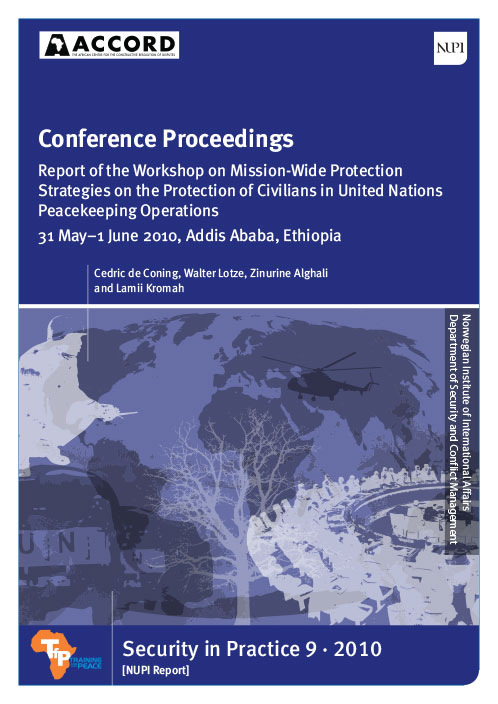
- Report
Report of the Workshop on Mission-Wide Protection Strategies on the Protection of Civilians in United Nations Peacekeeping Operations
Conference Proceedings from the Workshop on Mission-Wide Protection Strategies on the Protection of Civilians in United Nations Peacekeeping Operations, held from 31 May – 1 June 2010, in Addis Ababa, Ethiopia.
A workshop on mission-wide strategies for the protection of civilians (PoC) in United Nations peacekeeping operations was held from 31 May to 1 June 2010 in Addis Ababa, Ethiopia, organized by the United Nations (UN) Department of Peacekeeping Operations (DPKO), the Office for the Coordination of Humanitarian Affairs (OCHA) and the Global Protection Cluster, in collaboration with the African Centre for the Constructive Resolution of Disputes (ACCORD) and the Norwegian Institute for International Affairs (NUPI).
The workshop brought together representatives from UN peacekeeping missions (United Nations Mission in the Central African Republic and Chad – MINURCAT, United Nations Stabilization Mission in Haiti – MINUSTAH, United Nations Organization Stabilization Mission in the Democratic Republic of the Congo – MONUSCO, United Nations Operation in Côte d’Ivoire – ONUCI, United Nations Mission in Sudan – UNMIS and the African Union/United Nations Hybrid Operation in Darfu – UNAMID), the Protection Cluster, UN agencies, the African Union, International Committee of the Red Cross (ICRC) and protection experts.
Workshop participants reviewed the drafting and implementation of existing protection strategies for UN peacekeeping operations and discussed the draft outline for mission-wide strategies for the protection of civilians as developed by the DPKO, OCHA and the Protection Cluster prior to the workshop.
In addition to informing the development of a strategic framework for mission-wide protection strategies, the workshop also proved a useful opportunity for protection stakeholders, at both mission and headquarters levels, to interact with one another and to share lessons learned and good practices on protection strategies in UN peacekeeping operations.
In particular, the workshop highlighted the fact that peacekeeping missions, although operating in different contexts and therefore requiring unique context-specific approaches, could also benefit from the development of enhanced guidance on the design and operationalisation of protection strategies. However, it was stressed that the guidance should be framed so as not to hinder the flexibility needed by missions in order to implement protection strategies appropriate to the specific context.



